Before launching into another list about books on the work world and some links to older BookNotes lists I thought I would reprint something I wrote one year ago. It needs saying often — thanking our staff for their work, thanking you for your support of our work. And, all of us thanking teachers and others who have taught us well — we wouldn’t have many readers or book buyers without teachers, eh? So, hat tips all around. I hope you take a moment and read this.
As we are heading into the Labor Day weekend, some of us will have some time off. Restaurant workers, preachers, many health care providers, law enforcement personnel, those who work in the media, and those in retail may have to work extra hours this weekend to commemorate the significance of their labor. And those of us whose wages are on the lower end can’t afford to decline any overtime we might be offered.
Some people romanticize bookstore work, but our staff could quickly tell you about the difficulties here day by day. We are looking to hire a new staff member here and find it hard to even know what to call the opening. “Sales associate” sounds so antiseptic but I’m allergic to trendy monikers like “dream weaver.” Whatever we call the multi-tasking team here that keeps this ship afloat – Kimberlee, Amy, Patti, Robin, and Diana, the mail-out queen that wraps your packages so carefully – Beth and I are grateful beyond words. I know some of you are too, knowing that their love for books, people, and God’s Kingdom conspires to serve you well. Their work is worth much more than they are paid. While we don’t do this bookstore ministry for the acclaim, we are grateful for and to those customers and fans that notice. Thank you for caring about our work and for being a part of our story here.
Writers and readers and the booksellers that bring them together, yes, but there are so many more who are involved. We are grateful for publishers, printers, bookkeepers, sales reps and marketers, truck drivers who transport the cartons of books, the critics and reviewers and those who tweet and blog, those who tell others about good books they love. But also thank God for the manufacturing plants that make the paper — who manufactures the ink, and where, I wonder? who made the conveyor belts and loading docks at the distribution centers? who wrote the ad that caught your attention or the back cover copy? We daily praise God for the gifts of the artists that designed the books covers, even if we debate the wisdom of their aesthetic choices sometimes.
Thank God for it all, this wild, beautiful, life-changing business of books. We celebrate the many, many good writers whose work grace our shelves, but you – the readers! – are what it is finally all about. Without you buying the books, the whole process falls like a house of cards.
Which reminds us — we all should thank our elementary teachers or parents who taught us to read in the first place, and those other teachers and mentors who inspired us to want to remain readers and life-long learners.
So, thanks be for all who play their part in this exciting story.
Okay.
But.
Show of hands if you’ve heard a sermon about labor at church this (Labor Day) Sunday or maybe even if there was a prayer offered, for those in the workforce, for what most of us do day by day.
Yeah, I thought so.
Which is why we yet again want to remind you of our passion for books about faith and work, thinking Christianly about what we do with the work of our hands (or minds.)
The disconnect is simply inexcusable. We have to do better.
The other day I almost turned apoplectic when a friend who I admire greatly affirmed on social media a line by C.S. Lewis saying that one job above all others was “ultimate” in a sentence where C.S. also opined that we work in order to have leisure. I would guess Saint Clive learned that from pagan Plato, but it is simply — to use blue collar workplace lingo — bullshit. Of an unbiblical sort, no less. The Bible, brothers and sisters, says nothing of the sort.
But I suppose it is a bit much to ask for mature theological discernment about this since — as I think we all know — most churches simply don’t offer much time or energy or space in their resource centers to equip folks to think faithfully about labor. That even on Labor Day some congregations — ahem! — don’t even hint at the importance of the day, with nary a whispered prayer for us ordinary workers in the world, illustrates that we need these books now more than ever.
Sometimes I feel like congregants just have to be responsible and do this kind of work-faith integration on our own. We should gather together people in our fields outside of our own church and get reading, learning, praying, not excepting help or encouragement from our pastors, who are usually busy with their own work.
Other days I feel like the vision to be agents of the Kingdom in the workplace has to come from the clergy, from the pulpit, from the foundation of the liturgical space where worshipers gather to hear the word proclaimed and the Kingdom announced in all its fullness. It is the task of the church to equip the members for ministry in the world.
So maybe we should send this list to our pastors. Or maybe we should just skip them and find curious people in our own industries or workplaces or neighborhoods and spheres of influence who already are passionate about the offices or labs or shop or sales floor or board room. What do you think?
(See, by the way, a book we’ve listed often on other lists, Work Matters by Tom Nelson for the story of a pastor who began to shift his own congregation’s life together around these themes. Or, see the one described below called Radical Sending, for what local congregations are doing.)
***
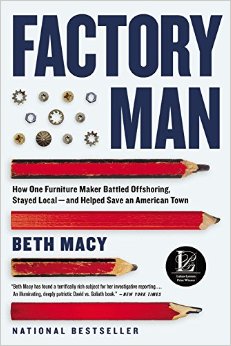 Last year, right before Labor Day, I reviewed a splendidly interesting book about the furniture industry in Virginia, and a colorful character who tried to fight the import of cheap stuff from China and tried to save his local factory. Not a terribly religious book, and the church isn’t very present in this story. Still, I thought it was sensational, riveting, heart-rending, inspiring. The book is called Factory Man: How One Furniture Maker Battled Offshoring, Stayed Local – and Helped Save an American Town, well-written by award-winning journalist Beth Macy. After describing it I listed six reasons why I think it is an important read.
Last year, right before Labor Day, I reviewed a splendidly interesting book about the furniture industry in Virginia, and a colorful character who tried to fight the import of cheap stuff from China and tried to save his local factory. Not a terribly religious book, and the church isn’t very present in this story. Still, I thought it was sensational, riveting, heart-rending, inspiring. The book is called Factory Man: How One Furniture Maker Battled Offshoring, Stayed Local – and Helped Save an American Town, well-written by award-winning journalist Beth Macy. After describing it I listed six reasons why I think it is an important read.
You can read that review here.
In that same review I paired it, rather whimsically, I suppose, to The Jesus Cow, a hilarious novel set in small-town Wisconsin written by rural, blue-collar writer Michael Perry. It seems right to name them again now if your Labor Day weekend considerations inspire you to read something somewhat related.
 Right before that, on September 3, 2015, my BookNotes newsletter was about one of the most eloquent and moving books about the spirituality of work I have read in years, Finding Livelihood: A Progress of Work and Leisure by Nancy Nordenson. Nothing has come out this year that can rival this for the sheer beauty and bravery of her intense exploration or her hope for a seamless, integrated life.
Right before that, on September 3, 2015, my BookNotes newsletter was about one of the most eloquent and moving books about the spirituality of work I have read in years, Finding Livelihood: A Progress of Work and Leisure by Nancy Nordenson. Nothing has come out this year that can rival this for the sheer beauty and bravery of her intense exploration or her hope for a seamless, integrated life.
Alongside the glorious book by Ms. Nordenson, I described one that a number of folks enjoyed: Invisibles: Celebrating the Unsung Heroes of the Workplace by David Zweig. He writes about people who are excellent at their work, sometimes extraordinary at a craft, but that is performed out of the limelight. It takes a certain sort of person who wants to be really, really good at their job but expects no acclaim or recognition. Invisibles explored a unique sort of work experience. And Finding Livelihood told of the authors particular work, but also her life — universal stuff, it seems to me.
You can read those two reviews here.
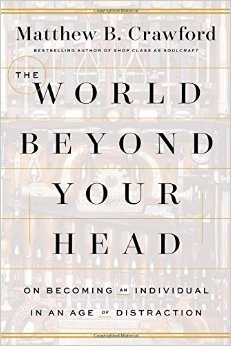 By the way, Invisibles brought to mind the very, very important book The World Beyond Your Head: On Becoming an Individual in an Age of Distraction (now out in paperback!) by the brilliant thinker, writer and motor-cycle repairman Matthew Crawford. It includes extended essays reporting on his fascinating interviews with skilled workers who have muscle memory and street smarts, who are at the top of their game when doing their hard, skilled work.
By the way, Invisibles brought to mind the very, very important book The World Beyond Your Head: On Becoming an Individual in an Age of Distraction (now out in paperback!) by the brilliant thinker, writer and motor-cycle repairman Matthew Crawford. It includes extended essays reporting on his fascinating interviews with skilled workers who have muscle memory and street smarts, who are at the top of their game when doing their hard, skilled work.
See my brief BookNotes comments about it here.
I assume you know Matthew Crawford’s previous best-seller Shop Class As Soul Craft: An Inquiry into the Value of Work. We’ve talked about it here for years, and it has gotten a lot of acclaim. A bit too academic, at times, it does hold up mechanical and industrial work as a good thing, a very good thing, and commends the importance and beauty of the vocation of being a tradesperson. He laments the shift away from shop class as we foolishly think we live in a “information” age. Anyway, both of Crawford’s books are well worth your time if you like fairly deep stuff.
***
AN INDUSTRY-SPECIFIC SET OF READINGS:
For those that want to explore some important, serious, foundational work-related books in a certain number of professional fields, I was honored to be asked to curate such a list for the Redeemer Presbyterian Church’s Center for Faith & Work. I so respect their creative, faithful, work in this area and commend their resources and conferences to you.
The industries that we resourced with recommended readings include academia, advertising/marketing, architecture, the arts, business, creative communication/design, education, entrepreneurship, fashion, finance, food, healthcare, law, retail, and science.
You can find these annotated lists that I did for them here.
I hope you know that we keep these kinds of books in stock the best we can. Send us a note if you want to talk more about any of this… or share the appropriate list with folks you know.
***
You probably know that I’ve compiled a number of lists of good faith-based books about the work-world, and have written essays about why church leaders should attend to the callings and careers of the congregants. I hope you don’t mind me revisiting this from time to time.
I invite you to read or review this good list, or this post (where I have a James Taylor video and talk about Tim Keller’s important book Every Good Endeavor and others.) The prices may have changed a bit since I first listed them (some books that were hardback are now maybe available in paperback, say.) Still, maybe you could share it with somebody who might find it helpful. Maybe you know a pastor or clergy person who might benefit from knowing this is a thing.
I list some essential classics in those lists and there are so many really, really good ones on vocation, calling, careers, and the faith/work intersection that I hardly need to update it; this list shows that there is a movement afoot, that this is a thing these days.
MORE BOOKS IN RECENT YEARS
But thanks be to God that there are even more books that have come out in the past few years. We’ve been in the vanguard on this for more than thirty years, and we are increasingly noticing folks all over the country doing excellent work in talking meaningfully about work.
I stand behind those previous posts, but consider this addendum, well, a sequel of sorts, more of the story that you are surely some part of. Thanks for telling the story, spreading the word.
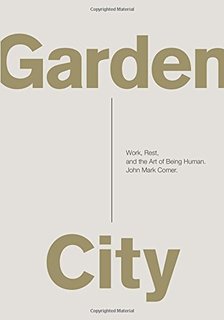 Garden City: Work, Rest, and the Art of Being Human John Mark Comer (Zondervan) $19.99 I raved about this previously, holding up its solid vision, its chatty, easily understood vision, its young-adult-friendly design and cool style. Love it. And, happily, many others do, too. This may be the best new contribution to this topic in ages — fun, clever, and, I think, truly insightful.
Garden City: Work, Rest, and the Art of Being Human John Mark Comer (Zondervan) $19.99 I raved about this previously, holding up its solid vision, its chatty, easily understood vision, its young-adult-friendly design and cool style. Love it. And, happily, many others do, too. This may be the best new contribution to this topic in ages — fun, clever, and, I think, truly insightful.
Here is what Bible scholar Scot McKnight has written of it:
In Garden City John Mark Comer takes the reader on a journey—
from creation to the final heavenly city. But the journey is designed to
let each of us see where we are to find ourselves in God’s good plan to
partner with us in the redemption of all creation. Smack-dab in the
middle of this set of ideas is Comer’s excellent sketch of work, a
sketch I find both pastorally mature and an exhortation to each of us to
know that all we do has value before God. There is in Garden City an
intoxication with the Bible’s biggest and life-changing ideas.
I really respect the writing and insight of Skye Janthani, and I agree with his take on this:
There is an awakening happening in the Western church. We are
rediscovering that God’s mission includes all of creation, not just
church work, and he intends for us to be flourishing people, not just
religious disciples. John Mark Comer’s book continues this awakening
with accessible insight into forgotten biblical truths about the
importance of our identity as women and men created in God’s image, the
value of our vocations in the world, and a ravishing vision of the
beautiful future we are building with God today. Everyone who reads this
book will see themselves, their work, and their world with new eyes
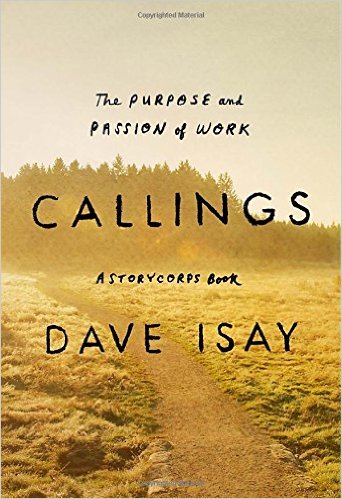 Callings: The Purpose and Passion of Work: A Storycorps Book Dave Isay (Penguin Press) $26.00 I suppose you’ve heard StoryCorp on NPR, those great little story-telling audio features. This brilliant book is the best survey of our attitudes about and stories of work since the classic Working by Studs Terkel. These short chapters are grouped under the categories of Dreamers, Generations, Healers, Philosophers, Groundbreakers. You might be surprised to see which jobs are described in which categories — Groundbreakers include a video game inventor, a county clerk, a pastor, a chef and restaurateur, a NASCAR driver, and a building contractor. Philosophers include a beer vendor and beekeeper and science teacher. (Not to mention a “salmon slicer.”) Healers might seem more predictable — lovely stories from an oncology nurse, a hospice chaplain, a 9/11 first responder, an Ob-gyn doc and an ICU nurse, but also iron workers, a grocer, and an English teacher. I loved the pieces by those who are doing what their forefathers or mothers did (farmer, actor, firefighter, a tool and die maker, an engineer, an oil rig driller, and more.) The book opens with those called Dreamers and it could include many of the workers who tell their stories, but these are especially powerful — an NBA referee, a library assistant, a dentist, a forensic artists, a street corner astronomer..
Callings: The Purpose and Passion of Work: A Storycorps Book Dave Isay (Penguin Press) $26.00 I suppose you’ve heard StoryCorp on NPR, those great little story-telling audio features. This brilliant book is the best survey of our attitudes about and stories of work since the classic Working by Studs Terkel. These short chapters are grouped under the categories of Dreamers, Generations, Healers, Philosophers, Groundbreakers. You might be surprised to see which jobs are described in which categories — Groundbreakers include a video game inventor, a county clerk, a pastor, a chef and restaurateur, a NASCAR driver, and a building contractor. Philosophers include a beer vendor and beekeeper and science teacher. (Not to mention a “salmon slicer.”) Healers might seem more predictable — lovely stories from an oncology nurse, a hospice chaplain, a 9/11 first responder, an Ob-gyn doc and an ICU nurse, but also iron workers, a grocer, and an English teacher. I loved the pieces by those who are doing what their forefathers or mothers did (farmer, actor, firefighter, a tool and die maker, an engineer, an oil rig driller, and more.) The book opens with those called Dreamers and it could include many of the workers who tell their stories, but these are especially powerful — an NBA referee, a library assistant, a dentist, a forensic artists, a street corner astronomer..
You get the point — this is a veritable handbook of thinking well about one’s calling in life, with these lovely testimonials by interesting folks. Christian readers, and certainly pastors, could learn much from this (even if most of the contributors do not use conventional theological categories to understand their jobs and passions.) A great, great book!
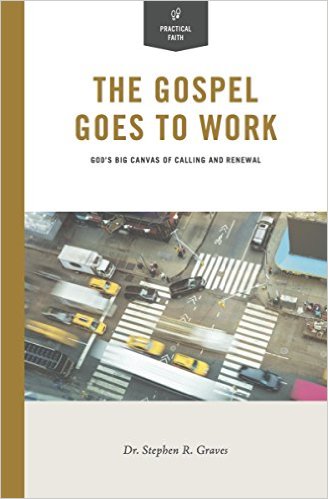 The Gospel Goes to Work: God’s Big Canvas of Calling and Renewal Dr. Stephen Graves (KJK Inc. Publishing) $10.00 For the price, this small paperback is one of the best bargains around. This book is mature, thoughtful, helpful, innovative, and uses a handsome two color ink design with very nice graphics giving it a contemporary, classy feel. Graves has been at this for decades and this is a very fine update to the state of the art of this conversation about Christian faith and daily work. This approach — which he calls “The Baseline and the Blue Sky” — offers practical pointers for whole-life discipleship framed by God’s big picture work. This is excellent.
The Gospel Goes to Work: God’s Big Canvas of Calling and Renewal Dr. Stephen Graves (KJK Inc. Publishing) $10.00 For the price, this small paperback is one of the best bargains around. This book is mature, thoughtful, helpful, innovative, and uses a handsome two color ink design with very nice graphics giving it a contemporary, classy feel. Graves has been at this for decades and this is a very fine update to the state of the art of this conversation about Christian faith and daily work. This approach — which he calls “The Baseline and the Blue Sky” — offers practical pointers for whole-life discipleship framed by God’s big picture work. This is excellent.
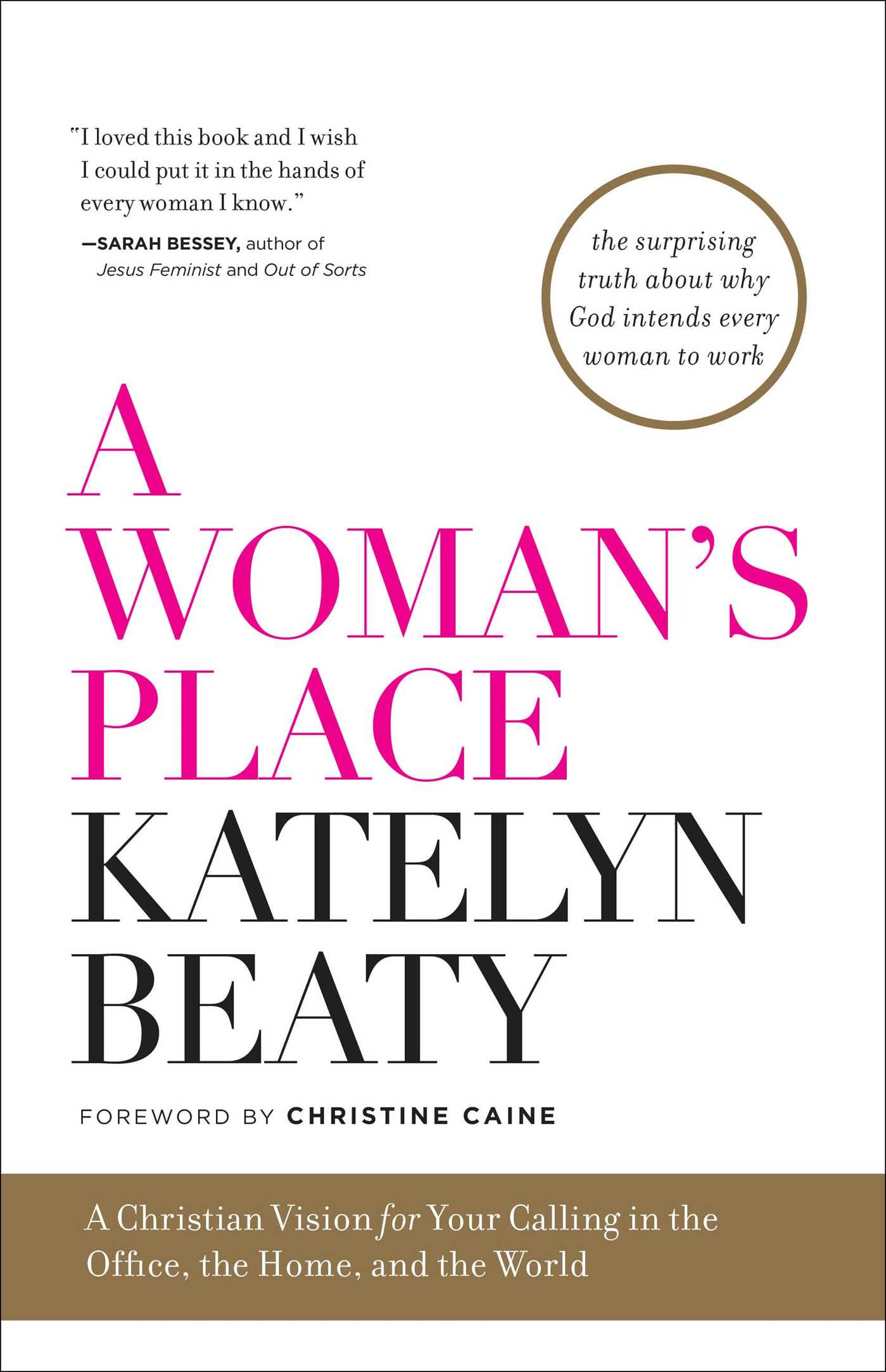 A Woman’s Place: A Christian Vision for Your Calling in the Office, the Home, and the World Katelyn Beaty (Howard Books) $22.99 This is a very nicely written book, thoughtful and at times provocative, insisting that God has created us — male and female — to reflect the image of God by working (paid or unpaid, at home or in the world) but that in our culture women have certain obstacles to overcoming in finding their own voice in the typical work-world culture. (And one of those obstacles may be unhelpful attitudes and teachings from some very prominent Christian leaders.)
A Woman’s Place: A Christian Vision for Your Calling in the Office, the Home, and the World Katelyn Beaty (Howard Books) $22.99 This is a very nicely written book, thoughtful and at times provocative, insisting that God has created us — male and female — to reflect the image of God by working (paid or unpaid, at home or in the world) but that in our culture women have certain obstacles to overcoming in finding their own voice in the typical work-world culture. (And one of those obstacles may be unhelpful attitudes and teachings from some very prominent Christian leaders.)
I agree with Karen Swallow Prior who says “Whether you are a man or a woman, whether you work at school, an office, or home, A Woman’s Place will inform, challenge and inspire you.” It draws on Amy Sherman’s must read Kingdom Calling and cites often Katherine Leary Aldorf, who co-wrote Tim Keller’s essential Every Good Endeavor and many interviews of many women who are making a difference in quiet ways, day by day, in their work. Dave Blanchard (of Praxis) calls it “excellent” and Scott Sauls says it has “elegance and prophetic strength.” It isn’t exactly Lean In for Christian women, although she does have a chapter on Sheryl Sandberg’s important book. Agree or not with every page, appreciate her humor or stories fully or not, this is an essential book in part because there is hardly anything in print like it. This book deserves to be discussed.
You can read my longer review here.
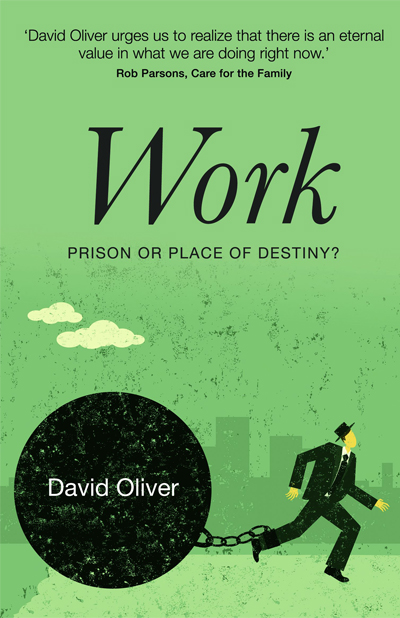 Work: Prison or Place of Destiny? David Oliver (Authentic) $14.99 This was written in 1999, published in England. I really like the sort of forward-thinking- real-world evangelicalism across the pond. This book seems a bit more practical than some more abstract ones, and yet more charismatic in tone, lively, Biblically, Spirit-lead, seeking churches that are in the front lines of God’s revival. This edition has been updated and there is an excellent afterword by Dr. Christian Overman who offers an overview of the theology of work centers and grad programs (in North America) that have sprung up in recent years. There is, by the way, also a chapter by Mark Greene of the London Institute for Contemporary Christianity. He used to work in advertising so knows well the struggles and temptations and opportunities within the so-called secular corporate world.
Work: Prison or Place of Destiny? David Oliver (Authentic) $14.99 This was written in 1999, published in England. I really like the sort of forward-thinking- real-world evangelicalism across the pond. This book seems a bit more practical than some more abstract ones, and yet more charismatic in tone, lively, Biblically, Spirit-lead, seeking churches that are in the front lines of God’s revival. This edition has been updated and there is an excellent afterword by Dr. Christian Overman who offers an overview of the theology of work centers and grad programs (in North America) that have sprung up in recent years. There is, by the way, also a chapter by Mark Greene of the London Institute for Contemporary Christianity. He used to work in advertising so knows well the struggles and temptations and opportunities within the so-called secular corporate world.
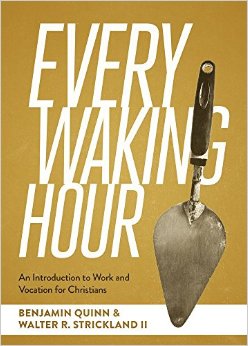 Every Waking Hour: An Introduction to Work and Vocation for Christians Benjamin T. Quinn & Walter R. Strickland (Lexham Press) $12.95 We discovered Lexham Press because they are doing the on-going project of very large, handsome, excellently translated hardback editions of Abraham Kuyper. This one — Every Waking Hour — is equally well done, but in a a compact, small hardback; it is part of a trio of companion volumes, Every Square Inch: An Introduction to Cultural Engagement for Christians by Bruce Riley Ashford and Every Good Thing: An Introduction to the Material World and the Common Good for Christians by David Jones. All three of these are handsome, clear, Biblical, a bit conservative in orientation. They are created in cooperation with Southeastern Baptist Theological Seminary. I’m very glad to see seminaries working on this stuff. Every Waking Hour is a very fine, no-nonsense introduction to this topic.
Every Waking Hour: An Introduction to Work and Vocation for Christians Benjamin T. Quinn & Walter R. Strickland (Lexham Press) $12.95 We discovered Lexham Press because they are doing the on-going project of very large, handsome, excellently translated hardback editions of Abraham Kuyper. This one — Every Waking Hour — is equally well done, but in a a compact, small hardback; it is part of a trio of companion volumes, Every Square Inch: An Introduction to Cultural Engagement for Christians by Bruce Riley Ashford and Every Good Thing: An Introduction to the Material World and the Common Good for Christians by David Jones. All three of these are handsome, clear, Biblical, a bit conservative in orientation. They are created in cooperation with Southeastern Baptist Theological Seminary. I’m very glad to see seminaries working on this stuff. Every Waking Hour is a very fine, no-nonsense introduction to this topic.
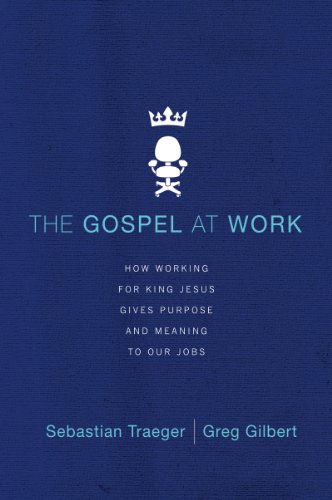 The Gospel at Work: How Working for King Jesus Gives Purpose and Meaning to Our Jobs Sebastian Traeger & Greg Gilbert (Zondervan) $16.99 I think this is a fabulous contribution to this topic…. again, it covers standard stuff, affirms the priesthood of all believers, invites us to reject a churchy sort of view that places ordinary work-world Christians as some kind of second class believer. Okay — clear enough, good enough. What this one brings to the conversation, though, is a robust and deep reliance on the gospel itself, the transforming power of Christ’s cross, the way we must put Christ first in all things, and understand the way grace transforms everything. It is like any number of books in its call to relate Sunday and Monday, to think Christianly about work. But fewer books invite us to a serious self-assessment about whether we have made our work an idol. Can trusting God alone and the goodness of God’s grace free us from the cultural pressures of either working too much, or maybe not enough? These good authors help us see how the gospel can free us from “both an all consuming devotion and a punch-in, punch-out mentality — in order to find the freedom of a work ethic rooted in serving Christ.” When this book says it will help us “find God’s vision for your job” it isn’t kidding. It’s solid, mature, transformational stuff, rooted in a gospel-centered approach. Good discussion questions, too.
The Gospel at Work: How Working for King Jesus Gives Purpose and Meaning to Our Jobs Sebastian Traeger & Greg Gilbert (Zondervan) $16.99 I think this is a fabulous contribution to this topic…. again, it covers standard stuff, affirms the priesthood of all believers, invites us to reject a churchy sort of view that places ordinary work-world Christians as some kind of second class believer. Okay — clear enough, good enough. What this one brings to the conversation, though, is a robust and deep reliance on the gospel itself, the transforming power of Christ’s cross, the way we must put Christ first in all things, and understand the way grace transforms everything. It is like any number of books in its call to relate Sunday and Monday, to think Christianly about work. But fewer books invite us to a serious self-assessment about whether we have made our work an idol. Can trusting God alone and the goodness of God’s grace free us from the cultural pressures of either working too much, or maybe not enough? These good authors help us see how the gospel can free us from “both an all consuming devotion and a punch-in, punch-out mentality — in order to find the freedom of a work ethic rooted in serving Christ.” When this book says it will help us “find God’s vision for your job” it isn’t kidding. It’s solid, mature, transformational stuff, rooted in a gospel-centered approach. Good discussion questions, too.
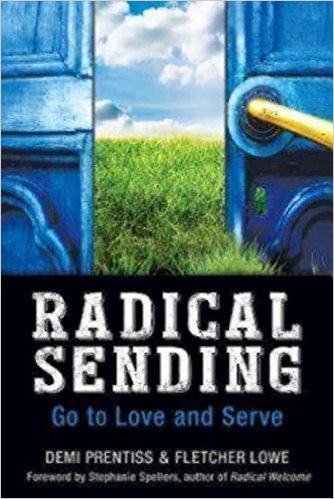 Radical Sending: Go to Love and Serve Demi Prentiss & Fletcher Lowe (Morehouse Publishing) $18.00 I find it interesting that some of the finest books in the 70s on this topic — the few that existed — came out of mainline denominational churches. (I think of the Lutheran Bethlehem Steel executive William Diehl who wrote Thank God Its Monday.) Dutch Calvinists at the alternative labor union in Canada were writing as were Mennonites and Catholics, but not too many evangelicals. Now, the faith/work conversation and the centers to study this are led by thoughtful evangelicals and conservative Protestants, it seems. This, though, comes from the mainline Episcopalian church and documents great examples of mainline, often liturgical parishes, that are equipping congregants to see their work as a mission field and that their work matters to God. Dorothy Sayers (who wrote the seminal “Why Work” essay) was Anglican, of course, so it is fitting to see Episcopalians taking up this tradition, rooted well in their own Book of Common Prayer and its call to the missio dei.
Radical Sending: Go to Love and Serve Demi Prentiss & Fletcher Lowe (Morehouse Publishing) $18.00 I find it interesting that some of the finest books in the 70s on this topic — the few that existed — came out of mainline denominational churches. (I think of the Lutheran Bethlehem Steel executive William Diehl who wrote Thank God Its Monday.) Dutch Calvinists at the alternative labor union in Canada were writing as were Mennonites and Catholics, but not too many evangelicals. Now, the faith/work conversation and the centers to study this are led by thoughtful evangelicals and conservative Protestants, it seems. This, though, comes from the mainline Episcopalian church and documents great examples of mainline, often liturgical parishes, that are equipping congregants to see their work as a mission field and that their work matters to God. Dorothy Sayers (who wrote the seminal “Why Work” essay) was Anglican, of course, so it is fitting to see Episcopalians taking up this tradition, rooted well in their own Book of Common Prayer and its call to the missio dei.
I explained a bit more about this good book in our “Best of 2015” column, which you can scroll through to find here if you want to read more. Kudos.
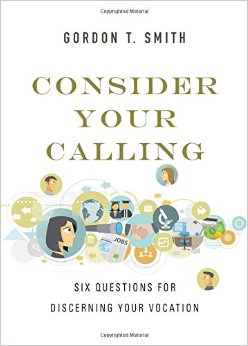 Consider Your Calling: Six Questions for Discerning Your Vocation Gordon T. Smith (IVP) $16.00 I have long appreciated Smith’s clear, intense writing about spirituality. He’s in the league with Richard Foster and the late Dallas Willard — and his recent work has insisted we need a more deeply rooted, spiritually-mature, Christianly-shaped sort of character (see Called to Be Saints!) One of his books which we listed on previous BookNotes bibliographies about calling and vocation is Courage and Calling; it is substantial and thoughtful. I have sometimes even called that one “Richard Foster meets Os Guinness” in that it has a robust view of calling but has a bit of a contemplative tone. In this newer, compact little book he gives us six questions to ask in reflecting upon one’s calling, a thoughtful guide to doing some inner work in considering one’s vocation. We reviewed it previously but it deserves to be on this list as it is so very useful and wise. Highly recommended.
Consider Your Calling: Six Questions for Discerning Your Vocation Gordon T. Smith (IVP) $16.00 I have long appreciated Smith’s clear, intense writing about spirituality. He’s in the league with Richard Foster and the late Dallas Willard — and his recent work has insisted we need a more deeply rooted, spiritually-mature, Christianly-shaped sort of character (see Called to Be Saints!) One of his books which we listed on previous BookNotes bibliographies about calling and vocation is Courage and Calling; it is substantial and thoughtful. I have sometimes even called that one “Richard Foster meets Os Guinness” in that it has a robust view of calling but has a bit of a contemplative tone. In this newer, compact little book he gives us six questions to ask in reflecting upon one’s calling, a thoughtful guide to doing some inner work in considering one’s vocation. We reviewed it previously but it deserves to be on this list as it is so very useful and wise. Highly recommended.
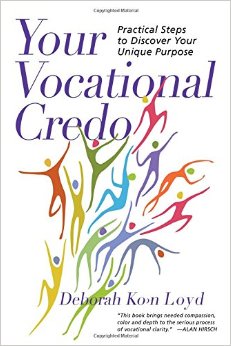 Your Vocational Credo: Practical Steps to Discover Your Unique Purpose Deborah Koehn Loyd (IVP) $16.00 I have to sometimes whittle it all down to one book — at the Jubilee conference each February, say, when students who want a practical, visionary, but useful book on discerning their own sense of call. So many young adults are still unclear about choosing a major, a field of study, a future career. And, I have to say, at least at this past year at Jubilee 2016. this was the one that most resonated with college age students. it is fun, upbeat, energetic, has lots of stories, a missional zeal, even. And it seems practical, even it is full of wonder and mystery and daring. If the smaller more sober one by Gordon Smith (Consider Your Calling, see above) appealed to those who wanted just those six questions, or a slightly more prayerful tone, this one seemed happily to meet the needs of many. Written by a wise young woman who promises to “walks you through the transformational journey of becoming the world-changer God has intended you to be.” Cool, huh? It’s good. Everybody needs “a vocational credo” and this resource can help.
Your Vocational Credo: Practical Steps to Discover Your Unique Purpose Deborah Koehn Loyd (IVP) $16.00 I have to sometimes whittle it all down to one book — at the Jubilee conference each February, say, when students who want a practical, visionary, but useful book on discerning their own sense of call. So many young adults are still unclear about choosing a major, a field of study, a future career. And, I have to say, at least at this past year at Jubilee 2016. this was the one that most resonated with college age students. it is fun, upbeat, energetic, has lots of stories, a missional zeal, even. And it seems practical, even it is full of wonder and mystery and daring. If the smaller more sober one by Gordon Smith (Consider Your Calling, see above) appealed to those who wanted just those six questions, or a slightly more prayerful tone, this one seemed happily to meet the needs of many. Written by a wise young woman who promises to “walks you through the transformational journey of becoming the world-changer God has intended you to be.” Cool, huh? It’s good. Everybody needs “a vocational credo” and this resource can help.
Here is what Brian McLaren writes of it:
First I would like to make this book required reading for every young person between the ages of, say, fifteen and twenty-nine. Then I’d like it to be required for everyone at midlife. Then, I think it should be given again to everyone at retirement. You couldn’t ask for a better guide in asking that most personal and persistent of questions: What am I doing with my one and only life?”
 More: Finding Your Personal Calling and Live Life to the Fullest Measure Todd Wilson (Zondervan) $15.99 I tend to like books that are well-written, a bit on the abstract side, nothing too formulaic or workbooky or simplistic. That’s me. But every now and then a book comes along that is very nicely written, is rooted in broad, good thinking, and yet offers a framework from which to obtain really practical guidance. This is one of those rare ones, informed by the likes of Os Guinness’s brilliant The Call and yet full of self-assessment questions and vocational guidance and down to Earth ideas of making decisions. Here is what the promo copy says about it:
More: Finding Your Personal Calling and Live Life to the Fullest Measure Todd Wilson (Zondervan) $15.99 I tend to like books that are well-written, a bit on the abstract side, nothing too formulaic or workbooky or simplistic. That’s me. But every now and then a book comes along that is very nicely written, is rooted in broad, good thinking, and yet offers a framework from which to obtain really practical guidance. This is one of those rare ones, informed by the likes of Os Guinness’s brilliant The Call and yet full of self-assessment questions and vocational guidance and down to Earth ideas of making decisions. Here is what the promo copy says about it:
Introducing a memorable vocabulary and an easy-to-use practical framework, More equips readers to embark on a journey of discovering their unique personal calling. It enables readers to answer three of the most important and profound questions we all naturally ask.
(1) Who am I created to be?
(2) What am I created to do?
(3) Where am I to be best positioned to do it?
The integrated answers to these key questions (the BE-DO-GO of a person’s life) represent the core dimensions of personal calling. Inspiring and challenging, More gives readers permission and encouragement to engage in the journey God has solely for them.
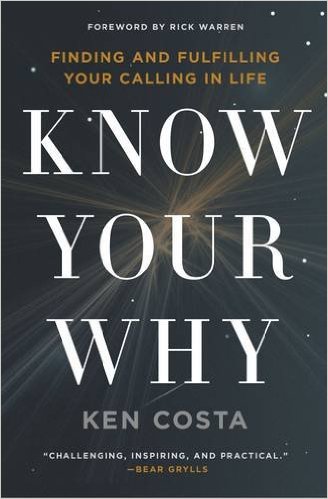 Know Your Why: Finding and Fulfilling Your Calling in Life Ken Costa (Nelson) $16.99 I was thrilled to see this new book being released — we have been glad to list and tell about his earlier book called God at Work and it was nice to know he had another one coming. Costa is an internationally renowned banker, having worked as chairman of UBS Investment Bank (and other financial marketing organizations in London.) Not every book — hardly any books, in fact — carry endorsements from Louie Giglio (of the Passion Conference) and the Archbishop of Canterbury (who says “This book has all of Ken at his best…Written from his own experience, it speaks to the concerns of young professionals everywhere.”) Brian Houston says “There are few people on the planet whom I find more fascinating than Ken Costa…” Inspiring, for sure! I trust it to speak about vocation and the call into the work world because I know the author’s other book and his remarkable experience within the financial institutions of the global economy.
Know Your Why: Finding and Fulfilling Your Calling in Life Ken Costa (Nelson) $16.99 I was thrilled to see this new book being released — we have been glad to list and tell about his earlier book called God at Work and it was nice to know he had another one coming. Costa is an internationally renowned banker, having worked as chairman of UBS Investment Bank (and other financial marketing organizations in London.) Not every book — hardly any books, in fact — carry endorsements from Louie Giglio (of the Passion Conference) and the Archbishop of Canterbury (who says “This book has all of Ken at his best…Written from his own experience, it speaks to the concerns of young professionals everywhere.”) Brian Houston says “There are few people on the planet whom I find more fascinating than Ken Costa…” Inspiring, for sure! I trust it to speak about vocation and the call into the work world because I know the author’s other book and his remarkable experience within the financial institutions of the global economy.
![]() EmotiConversations: Working Through Our Deepest Places John Elton Pletcher & Holly Hall-Pletcher (Resource Publications) $20.00 I hope you recall that we’ve given a shout out or two to a lovely little novel by Pletcher — a parable, really, which allows us to enter this faith/work conversation in story form — called Henry’s Glory. We are always glad to promote really unique books that are solid and useful like this when it is written by a friend and customer we trust, and Henry’s Glory brought a fresh voice into this body of literature. Well, Rev. Pletcher here goes a bit deeper and (get this) has partnered with his mother (Holly) to co-author this book about the complex and fascinating topic of emotions in the workplace. Wow.
EmotiConversations: Working Through Our Deepest Places John Elton Pletcher & Holly Hall-Pletcher (Resource Publications) $20.00 I hope you recall that we’ve given a shout out or two to a lovely little novel by Pletcher — a parable, really, which allows us to enter this faith/work conversation in story form — called Henry’s Glory. We are always glad to promote really unique books that are solid and useful like this when it is written by a friend and customer we trust, and Henry’s Glory brought a fresh voice into this body of literature. Well, Rev. Pletcher here goes a bit deeper and (get this) has partnered with his mother (Holly) to co-author this book about the complex and fascinating topic of emotions in the workplace. Wow.
This is both intriguing, insightful, and, I think, more useful then many of us may want to admit. I don’t know if the title — EmotiConversations — works adequately to express just how important and valuable this book is. I admire the courage of it’s subtitle “working through our deepest places” but, although it is mature, it isn’t intense or heavy. Blurbs on the back are from the popular Peter Greer who recommends it to leaders, especially, and another by a workplace chaplain and a rave by the director of a worldview ministry. Smart folks like these so appreciate the creative mix here — “intriguing stories, motivating themes from the Scriptures, and savvy life skill” stuff. You will to, whether you work in an office or shop floor, in retail or education, at church or at home, even.
Just yesterday at the grocery store I stood speechless as a customer so verbally assaulted a teenage check out girl that the cashier was reduced to tears. I also saw a calm manager who was called in fully skip the emotional tension of this crying employee. A little social and emotional intelligence could go a long way for most of us, and it’s absence is sometimes heartbreaking. For Christians hoping to serve as salt and light in the workplace, this could really be a valuable resource.
BookNotes
DISCOUNT
ANY ITEM MENTIONED
10% off
order here
takes you to the secure Hearts & Minds order form page
just tell us what you want
inquire here
if you have questions or need more information
just ask us what you want to know
Hearts & Minds 234 East Main Street Dallastown, PA 17313 717-246-3333
